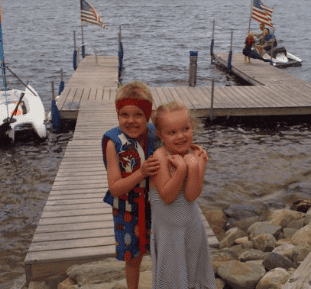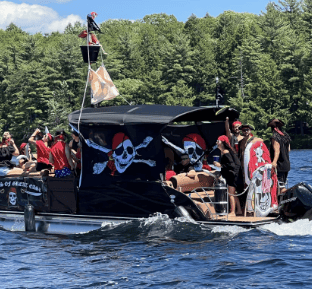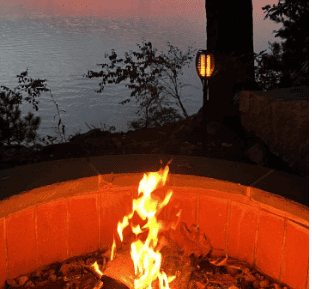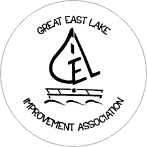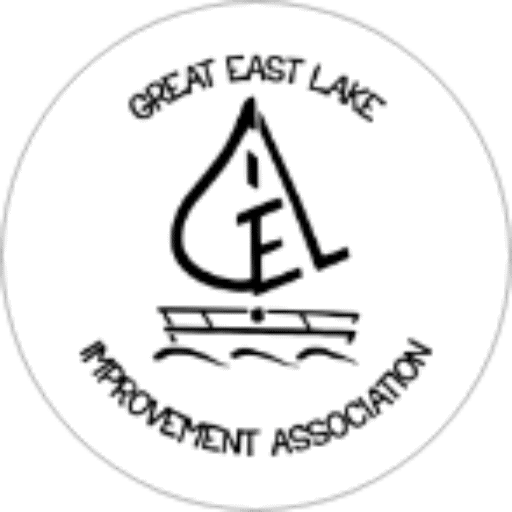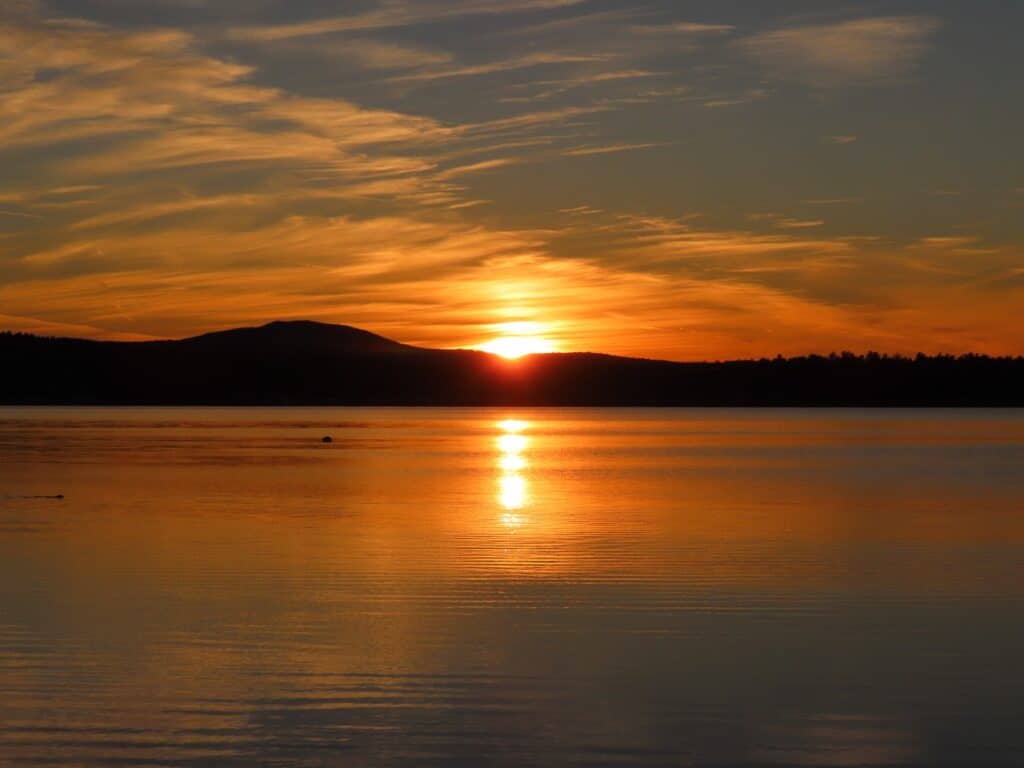Love Our Lake
We all love Great East Lake, but keeping it special depends on each of us doing our part.
Love our Lake is a GELIA project aimed at education, raising awareness and strengthening community support for protecting the lake and the quality of life for all who enjoy the lake.
This begins with basic courtesy and respect – for our neighbors and other users of the lake, for our water and wildlife, and for the laws and rules that help protect our lake and keep us safe. We all enjoy the lake in different ways, and a little common sense, courtesy and respect goes a long way to keeping Great East the special place we all love. So please do your part, and also make sure your guests and tenants are familiar with the information below.
 Boating safety and courtesy:
Boating safety and courtesy:
This website has an entire section devoted to boating safety so we won’t cover it all here. But here are a few highlights to keep you afloat:
Observe headway speed laws. That means 6 mph or less when you’re within 150 feet (NH) or 200 feet (ME) of shore, rafts, other boats or swimmers. The entire Copp Brook, Scribner River, First Basin, and channel leading to the boat landing are all headway speed areas. Please also use care not to churn up the lake bottom in shallow areas, which can lead to increased algae and cyanobacteria growth.
Watch your wakes. Almost any boat can make a large wake — not just wake boats. The biggest wakes come from boats operating at mid speed, plowing through the water and not on a plane. A boat making a large wake can still cause damage to shorelines and boats tied up to docks, create erosion, damage animal and loon habitats and cause dangerous situations for swimmers, smaller boats and kayaks. So please be careful. If you’re making a large wake for water sports, please stay as close to the center of the lake as possible, and keep aware of how your wake may impact others. As the Water Sports Association reminds us, you are responsible for your own wake. For additional information, please go to:
Right of way. Swimmers and non-motorized boats such as canoes, kayaks and sailboats always have the right of way. Please be attentive.
Age and certification
NH – must be 16 years old to operate a boat or PWC with 25 HP or greater. Everyone 16 years of age or older who operates a boat or PWC over 25 HP must have a boating education certificate. NH Marine Patrol Boating Education
 ME – Must be 12 years or older to operate a boat with 10 HP of greater, unless under supervision of someone at least 16 years old. No one under 16 may operate a PWC. Persons 16 and 17 may operate a PWC if they have completed an approved safety education course, or are accompanied by a person 18 or older. Boating Safety
ME – Must be 12 years or older to operate a boat with 10 HP of greater, unless under supervision of someone at least 16 years old. No one under 16 may operate a PWC. Persons 16 and 17 may operate a PWC if they have completed an approved safety education course, or are accompanied by a person 18 or older. Boating Safety
Reckless operation. Operating a boat under the influence of alcohol or drugs is a criminal offense, and dangerous to you, your passengers and others. Other reckless operation includes weaving through congested traffic, prolonged circling, or cutting across the wake or bow of another boat at greater than headway speed.
Lighting. All boats must have navigational lights on when operating between sunrise and sunset.
Heads up for Loons and other wildlife. As we’ve all experienced, loons can pop up anywhere. Please stay alert for loons and other wildlife and keep a distance, especially if a loon has chicks in tow. Be aware of how your wake may impact wildlife and nests.
Trash. Please keep a trash receptacle in your boat, and don’t throw trash overboard.
Help Keep our Lake Clean!
Great East Lake is one of the cleanest lakes in the region, and it takes a concerted effort on all our parts to keep it that way. Please help protect our clean water!
Erosion. Storm water runoff is the #1 pollution threat to our lake.
Runoff happens when we build roads, houses, lawns and driveways. These impermeable surfaces do not absorb rain. Storm water runoff picks up pollutants such as soil, fertilizers, pesticides and petroleum products. Soil erosion contains phosphorus that acts as plant food, causing aquatic plants to grow excessively, and can promote the growth of cyanobacteria. Runoff can also contain harmful bacteria, viruses and toxic materials from the land. There are many simple steps you can take to minimize erosion, including the slowing or diversion of storm water and planting vegetation buffers. Learn more about what you can do stop erosion from your property by visiting Conservation Practices For Homeowners
Alterations to your shoreline require town and state permits.
Fertilizers. Don’t use fertilizers (except for lime) near the lake.
Most fertilizers contain phosphorus, which is very damaging to the lake. Even a relatively small amount of phosphorus can result in ugly algae blooms which use up the oxygen in the water and can kill fish and beneficial aquatic plants, and can promote the growth of toxic cyanobacteria.
Septic Systems.
Everything that goes down the drain, toilet, dishwasher, bathtub, and/or washing machine ends up in your septic system, which must be maintained in order to function properly. The leachate or effluent from your septic system eventually filters through the soil and becomes groundwater. If your system was located and installed properly and is maintained, this arrangement works to naturally filter out the pollutants. However, inadequately functioning and/or failing septic systems contribute to groundwater contamination. Effluent from failing septic systems is a major lake water quality concern.
Don’t use your septic system to dispose of toxic chemicals such as paint, gasoline, waste oil, and harsh household cleaners. They destroy beneficial bacteria in the system causing major backups and problems. Try to use low phosphate detergents.
Please know the location, condition and maintenance needs of your septic system. Do not wait until your system shows signs of failure to have your septic tank pumped out. Call a septic system pumper to inspect your system at least once every three years and pump as needed.
 Fireworks.
Fireworks.
Lots of people enjoy celebrating our country’s birthday with fireworks. Unfortunately, please be aware that fireworks contain phosphorous and nitrogen, which are the worst pollutants for the lake and promote algae and cyanobacteria growth.
Fireworks are prohibited in Wakefield, NH and certain types of fireworks are prohibited in Maine.
While no fireworks would be ideal for the health of the lake, we expect that some folks will use fireworks. So, please consider these steps to reduce the impact:
– Use them on the 4th of July only. The lake will thank you.
– Use them as far away from the lake as you can do safely.
– Ask your renters not to use fireworks.
No soaps or shampoos for washing of hair, bodies, clothes or animals is allowed in the lake
For more information on erosion, fertilizers and keeping our lake clean, please go to… AWWA Collaboration
Loons and other wildlife
One of the signature joys of Great East Lake is our loons, with their striking beauty and haunting call. We are fortunate that GEL is home to many loons, with pairs frequently nesting in and around Copp Brook, Scribner River, Loon Island and the Basins.
Nesting is a vulnerable time for loons, who generally incubate eggs between late May and early July. Loon chicks typically hatch in early July, which is also one of the busiest times on the lake. Please take these steps to help protect our loons.
Give Loons Space.
Please stay at least 150 feet from loons, and give a loon more space if it calls or shows other signs of distress, or if it is on the nest. Loons can abandon a nest if approached by people. Signs of distress include the craning of its head downward, the “crazy laughter” alarm, or rearing up and thrashing in the water.
Fish Lead Free. It’s the law!
The leading cause of loon deaths is ingestion of lead fishing tackle from a line or attached to a fish. Please use only non-lead fishing tackle.
Boaters beware.
Loons can pop up anywhere, and newborn chicks can be very hard to see in the water – so please, be on the alert. Please also note that wakes can damage nests, which loons build right at the water line.
For more information on Loons, please visit the Loon Preservation Committee, or you can call the Loon Center at 603-476-LOON.
Great East is home to many other kinds of wildlife, including beaver, muskrat, otters, deer and even the occasional Moose, bear, mountain lion, fisher cat.
Frequent birds include bald eagles, great blue heron, cormorants and mergansers (which are often confused with loons) and ducks. Please do not feed ducks, as the parasites in their feces can cause bad rashes known as swimmers itch.
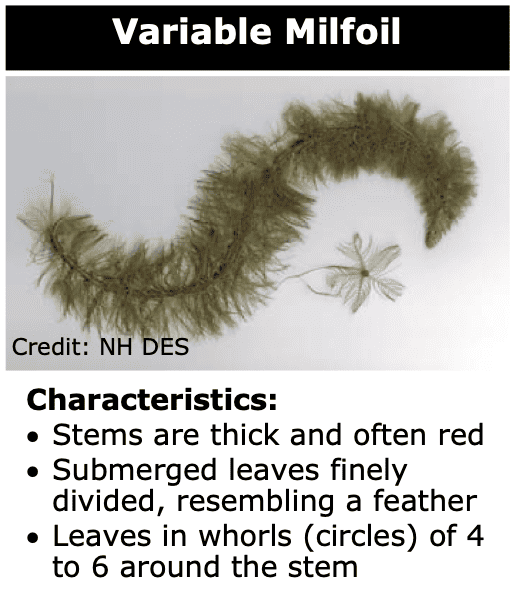 Weeds and invasive species
Weeds and invasive species
Invasive aquatic plants have been a problem in lakes in NH and ME for several decades. Variable milfoil is by far the most widespread, and has been found in many lakes and ponds.
Thanks in part to attentive boat owners, and GELIA’s active Weedwatcher and Lake Host Programs, small incidents of invasive weeds in our lake have been quickly detected and eradicated, but we must be ever on alert for invasive weeds
Early detection of invasive aquatic plants ensures the most effective control. Once an invader is well established, eradication is extremely difficult and costly, if not impossible. Variable milfoil infestations in lakes and ponds make recreation dangerous and unpleasant, and reduced property values.
What can I do? Clean your boat and trailer of all aquatic vegetation, animals, mud, and other debris each time before entering or after leaving the lake, even if a Lake Host isn’t present to help you. For more information Click Here
Noise
Please remember that sound – whether music, voices or other noise — carries easily over the water, especially at night, and can interfere with the enjoyment of others. If you can feel the bass, rest assured your neighbors can too. So our advice is, have fun, but also use some common sense and courtesy. The Boat Owners Association of the United States urges boaters to keep music at responsible levels, especially near shore. We think that’s sound advice.
Light Pollution
The increasing use of powerful home, yard and dock lighting can impact your neighbors’ ability to see and enjoy the night sky. Please follow these common sense tips to avoid light pollution:
– Please shine lights down, rather than up or toward the water, and avoid use of bright lights in the immediate shore area.
– Use only the light you need, and consider using timers or motion detectors.
– Please keep lights focused on your property, and not spilling over to your neighbors’ property.
Our Favorite Photos of Great East Lake
